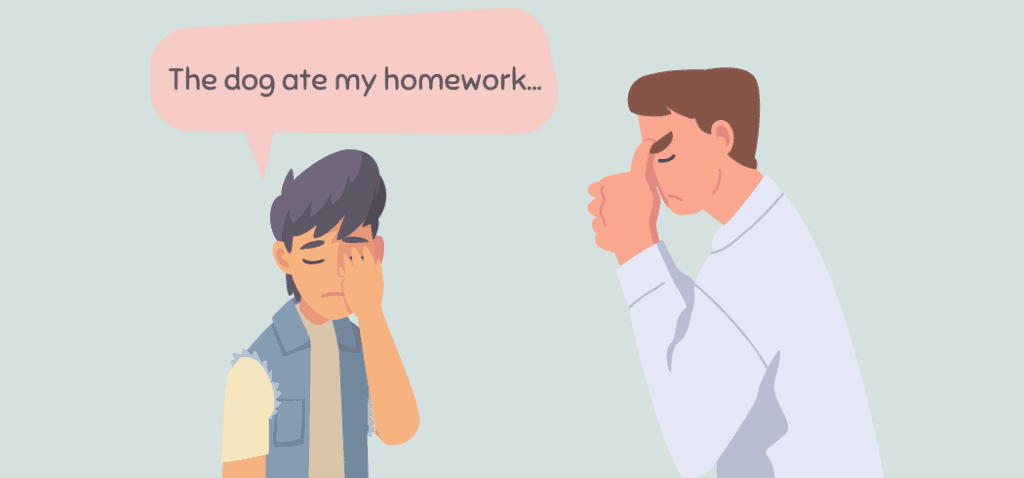Have you wondered why people say, “it’s raining cats and dogs”? Or why “every dog has its day”? Some phrases about dogs have been around for centuries, and we’ve integrated them into ordinary conversations. I actually use a ton of these phrases in writing, but I’ve also grown up hearing them used in various ways. Let’s discover more about the meaning and origin of the sayings with “dog” in them.
Where Did Dog Idioms Come From?
Like most animal idioms, dog cliches might be older than you think, with some dating back to Julius Caesar. But have you ever wondered what all these expressions mean? We associate dogs with happiness and carefree life, but many dog idioms are gloomier than you think.
Funny Dog Idioms
There are more than a handful of canine idioms in the English language, ranging from euphemisms to Cockney rhyming slang. Since canines and humans have been pals for millennia, this should be no surprise.
The Dog Ate My Homework
According to what I found in the Oxford English Dictionary, the first printed use of the excuse “the dog ate my homework” can be traced back to a speech by retiring headmaster James Bewsher in 1929.
How this comment is worded gives the impression that the entire “my dog ate my homework” narrative was already in circulation for some time before it was placed on paper.
Doggy Bag
Are you unable to finish your food but feel it is simply too delicious to throw away? Why not ask your waiter for a box or bag to take your food home in? It is believed that the earliest use of doggy bags was a courteous way to ask to take restaurant leftovers home by saying that dinners were bringing it for your puppy.
Doggy bags are still commonly used today for this purpose. All the diners desired were the previous day’s leftovers for breakfast the following morning.
Dog’s Body
Peas pudding, often known as “dog’s body,” was the primary source of nutrition for members of the Royal Navy during the 19th century. This dish was made by boiling dried peas and eggs in a bag.
Later on, it evolved into a word that was used to refer to an individual who did all the labor that higher-ranking officials in the Navy did not want to do. It is likely because nobody enjoyed eating peas pudding.
Believe it or not, I eat this dish several times a year as it’s a Newfoundland specialty. I had no idea until now it had a relation to an old idiom.
Dog Idioms and Puns
It’s Raining Cats and Dogs
There are more possible origin stories for this phrase than there are dog treats on the entire planet. Ideas include:
- Allusions to Norse mythology.
- Translations of arcane French terminology.
- Even stranger conjecture concerning thatched roofs.
The theory that “it’s raining cats and dogs” originated from the satirical poem A Description of a City Shower written by the poet Jonathan Swift is the one that seems to hold the most water.
In this poem, Swift criticizes the society of London in the year 1710 by implying streets would be flooded and animals would drown. Later, Swift compiled a collection of familiar and brilliant words into a book, which included the phrase “raining cats and dogs.”
As Mean as a Junkyard Dog
Why is it that the dogs who live in junkyards always seem to be so tremendously hostile and even vicious? You could claim that they are there to prevent anyone from coming too close to them. They rarely even feel the urge to make a sound.
The proverb junkyard dog conveys the idea that a person is ruthless. A person who is harsh or eager to fight can also be described using this term.
Better the Head of a Dog Than the Tail of a Lion
This is one of those clever phrases you can figure out with little imagination. It’s a phrase used to describe a situation where one would rather be the leader of a smaller group than a subordinate in a more popular one.
A Shaggy Dog Story
This is an expression that means a narrative that has the potential to be amusing but almost always turns out to be unreasonably long. When someone is telling a joke, this phrase is frequently used in the context of the joke having an abrupt or meaningless ending.
Hair of the Dog
In the Middle Ages, people who rabid dogs bit were advised to put the dog’s hair on the wound to help heal and prevent infection. This piece of advice has developed through time to accommodate more contemporary circumstances.
Today, the term “the hair of the dog” is most frequently heard in the context of advising someone who had too much to drink the night before to take the “same drink from the previous evening” (also known as “the hair of the dog”) the following day to cure their hangover.
Puppy Idioms
Everyone loves puppies. What we love even more is the chance to use them in adorable expressions.
Puppy Love
The smile on a person’s face while they are falling for their new beaux, is the clearest indicator that they are experiencing puppy love, which might mean being smitten or referring to a form of love more common in adolescents. In all honesty, it has a mushy consistency.
Puppy Dog Eyes
My kids give me puppy dog eyes all the time. And who can say no to a puppy looking at them with those heart-melting eyes? It’s no different with children. Today, it’s a common expression people use when describing someone making an adorable face when they want something.
Pretty as a Speckled Pup
It’s an idiom used to describe someone or something incredibly cute.
Bought a Pup
It is a manner of referring to someone who has been tricked. For instance, they believed they were purchasing something significantly superior to what they obtained.
Your Dog Is Not My Dog Idiom Meaning
When you tell someone, “your god is not my dog,” it means their problem is not yours. You will commonly find it shortened to “not my dog.”
Dog Idioms to Use in Your Writing
Let Sleeping Dogs Lie
Let sleeping dogs lie means avoiding a situation that might cause disturbance when tackled. The expression “let sleeping dogs lie” is a gentle nudge to refrain from putting oneself in needless peril or risk. This proverb comes from the old belief that rousing a sleeping dog, particularly in a hasty manner, could result in severe consequences.
This is true even more so in the case of guard dogs, which, if awakened, are highly inclined to launch an attack. This expression is now commonly used to refer to a wide variety of scenarios in which one might prod something that would be better off not being disturbed.
The proverb “Let sleeping dogs lie” is meant to serve as a warning, either to another person or to oneself, regarding the potential risks posed by a particular action or behavior.
For instance, a buddy might use this expression to warn another person against engaging in behavior that would be better off avoided.
One further option is to simply repeat the statement out loud to themselves as a gentle reminder not to act hastily or precipitously. When trying to “wake a sleeping dog,” it is crucial to be calm and controlled.
Go to the Dogs
This expression showcases dissatisfaction with how things are proceeding, whether in politics or football teams. As an illustration, one can say, “this situation has gone to the dogs.” Greyhound racing likely is where the saying got its start.
It refers to the risks associated with gambling; a person said to have “gone to the dogs” is likely to have gambled away their entire paycheck on the dog races. Dog welfare organizations such as Dog’s Trust and the RSPCA advocate for more humane treatment of racing dogs, even though the sport may be entertaining and addicting.
His/Her Bark Is Worse Than His/Her Bite
We use this idiom when talking about someone who sounds more threatening than they are. When someone tells you their angry or hostile remarks cannot hurt you, they use the phrase “bark is worse than one’s bite.” This expression suggests that the person in question talks as if he will be vengeful or violent, but in reality, their deeds will not be as aggressive as their words.
A person whose words are more harmful than his actions may criticize you, but they will not make an effort to hurt your professional reputation or punch you in the face.
The phrase “bark is worse than one’s bite” first appeared in print about the middle of the 1600s. Its meaning refers to the notion that a dog barking at you will be too preoccupied with barking to bite you.
Dog behaviorists believe that a dog barking out of fear is not as fearless as a dog eager to bite; an aggressive dog will growl rather than bark in response to a threat.
Dog-Tired
Saying you are “dog-tired” means you are exhausted. The origin can be traced back to an old story about Alfred the Great, who is said to have sent his sons on hunting expeditions with his enormous kennels of hunting dogs.
Whichever of his sons, Athelbrod or Edwin, was successfully capturing a more significant number of the hounds would be given the right-hand side seat at the dinner table that evening by their respective fathers. They would end up “dog-tired” from these pursuits, but they would celebrate their success with joy.
The tradition was carried on for a few more generations, but following Bede’s Ecclesiastical History of the English People, no further mention of it can be found in written sources.
In the Doghouse
Being in the doghouse means you’re in a bad situation because someone is angry with you. When partners in a relationship argue, they sometimes need some space apart from one other rather than trying to sort things out.
Taking a stroll, going for a drive, or putting someone in “the doghouse” are all possible interpretations of this phrase.
The first such mention of a spouse being sent to “the doghouse” can be traced back to J.M. Barrie’s iconic children’s book, Peter Pan, published in 1911.
You might remember from the narrative that the Darling family has a dog in the story called Nana. A kennel, also known as a doghouse, is a tiny shelter in the yard that is fashioned in the shape of a house.
This is where Nana resided back when it was the norm. When a repentant Mr. Darling realizes that he is to fault for the abduction of his children by Captain Hook, he locks himself in the kennel that Nana keeps for her dogs.
Barking up the Wrong Tree
“Barking up the wrong tree” is a commonly used idiom with more complexity behind it. It is generally used to describe a person who has chosen the wrong course of action, but the meaning can differ based on the context.
The expression “barking up the wrong tree” was used in the United States during the 19th century. It refers to raccoon hunting using a hunting dog. The dog is trained to wait at the base of the tree for its owner to return whenever a nocturnal animal climbs into a tree.
In the darkness, however, if the hunter’s dog misidentifies the tree as the one where the raccoon has taken refuge, the hunter risks losing the animal.
Dog-Eat-Dog
The expression “dog-eat-dog” refers to a harsh and competitive environment. The idiom can also have a more violet meaning, describing people that would harm others to get what they want.
The earliest known origin of this term derives from the Latin proverb “canis caninam non est,” which translates literally to “dog will not eat dog.” The Oxford English Dictionary documents the phrase’s reemergence in 1794, albeit without the “not.”
By the 19th century, it’d become a frequent way to refer to the cutthroat, competitive nature of the world in modern society and commerce. A dog-eat-dog world.
Sick as a Dog
The idiom “sick as a dog” describes someone who feels very ill. The comparison of unwanted things to dogs was prevalent in the early 1700s, when the expression “sick as a dog” started. This was the period in which the phrase was first used.
This is not because people did not like dogs at the time. Instead, the rationale is that diseases like the plague were frequently transferred via animals like rats or dogs.
Growing up in rural Newfoundland, I heard this phrase used all the time. Any time someone was sick with a cold or flu, they said they were sick as a dog. Only, it was more like, “I’m sick as a dawg, m’dear”.
Dog Days
The expression “dog days” refers to the hottest time of the year. When people talk about dog days, it’s mainly in a context where it’s challenging to get anything done because of the heat.
When viewed from the Northern Hemisphere in late July, the “dog days” time when Sirius appeared to rise in conjunction with the sun. This occurred in ancient Greece and Rome. They believed that the combined heat from the two stars caused these days to be the hottest of the year, a time that may bring about fever or even a catastrophe.
Since the beginning of written history, people have been complaining about the weather, and the dog days of summer were a particularly significant time for everyone. In particular, the ancient Greeks and Romans had negative thoughts about Sirius because they connected it with an intolerable heat and fever epidemic.
You Can’t Teach an Old Dog New Tricks
Not being able to teach an old dog new tricks means that someone cannot learn something new. The phrase is used when someone is too stubborn in their ways and refuses to learn how to do something in a new fashion.
The phrase or adage “you can’t teach an old dog new tricks” was first referenced in John Fitzherbert’s book The Book of Husbandry, released in 1534. Since then, several authors have taken the phrase or proverb and utilized it in various senses, depending on the situation.
Dog-Eared
This expression refers to a book that has pages that have dog-eared corners has been used so frequently that the page corners have been ripped off or turned down. In my line of work, it’s a blasphemous thing to do.
Every Dog Has Its Day
This idiom has a deeper meaning with a lot of historical background. It describes a person (usually of low status) living a moment of glory. This idiom dates back several thousand years, although it has not always been expressed in this particular manner in the English language.
Erasmus was able to trace the origin of the metaphor back to a Macedonian adage that discussed the passing of Euripides in 406 B.C. He was attacked and killed by his rival’s dogs.
In the early 1500s, a letter written by Queen Elizabeth had the earliest known instance of the phrase being used in the English language. In 1550, John Strype published the letter in a collection called Ecclesiastical Memorials.
Call Off the Dogs
Calling off the dogs is a figure of speech we use when someone stops criticizing another person. The dogs being referred to in this expression are those used for hunting. As a standard method of intimidation, these dogs are frequently set free. They are dismissed from their duties and returned to their kennel once they have completed their assigned tasks.
By comparison, the expression refers to a circumstance in which one is advised to quit acting violently against another person.
Underdog
Someone who is not considered a favorite to win a tournament or contest is known as an underdog. It’s a term commonly used in sports and other similar competitions. As a fiction author, I see this term used a lot in the writing community. Readers always root for the underdog character.
An underdog is a term that can be applied to anyone who is at a disadvantage, whether it be in general or in a specific situation. It is customary in the world of sports to refer to the favored team coming out on the losing end as the underdog.
Around the year 1887, this term was first used in the context of dogfighting to denote a dog that had been defeated in a battle.
A heroic dog who went underdog in a cartoon from the 1960s was shown as an improbable (and unqualified) figure. The slogan for the show was “There is no reason to be afraid! Underdog is here!”
Dog-and-Pony Show
This idiom is used to describe something fancy and flashy. Marketing comes to mind when thinking about this idiom. In finance, this idiom refers to, in most cases, a seminar or presentation intended to advertise new items or services to prospective purchasers.
Apparently, the phrase originated from the itinerant circuses that toured rural areas throughout the United States and featured performing dogs and horses. It is an expression that typically has a pejorative connotation.
This expression refers to overly dramatic shows that are not fun to put on but are frequently required.
It’s a Dog’s Life
The idiom “it’s a dog’s life” refers to an unhappy existence. This phrase refers to the wretched and servile lives that dogs were forced to live during the 16th century and was initially recorded in a manuscript from that period.
Like a Dog with Two Tails
The popular phrase “like a dog with two tails” refers to someone overjoyed or joyful. It alludes to the concept that a dog wags its tail as a sign of pleasure or contentment. The idiom originated in Southern Canada.
Most publications that investigate the origins of idioms were unaware of this. They point to a magazine called American Speech from the early 20th century as the source of this term’s first recorded use. Duke University published American Speech.
A Scottish engineer named John Mactaggart traveled to Upper and Lower Canada. He was there in the early 1800s. It was decided to recruit him to assist in constructing a bridge that would cross the Ottawa River at Chaudière Falls and connect the two Canadian provinces.
After returning to England, he wrote the book Three Years in Canada, in which he made the following proclamation: “Off went the Laird, as proud as a dog with two tails.”
Final Thoughts
You can use plenty of dog phrases to enrich your vocabulary, but some of them are less known to those who aren’t native English speakers. With some of them being as old as time, it’s fun to see where these idioms originated and how we use them in everyday language.
Check out some others we covered:




